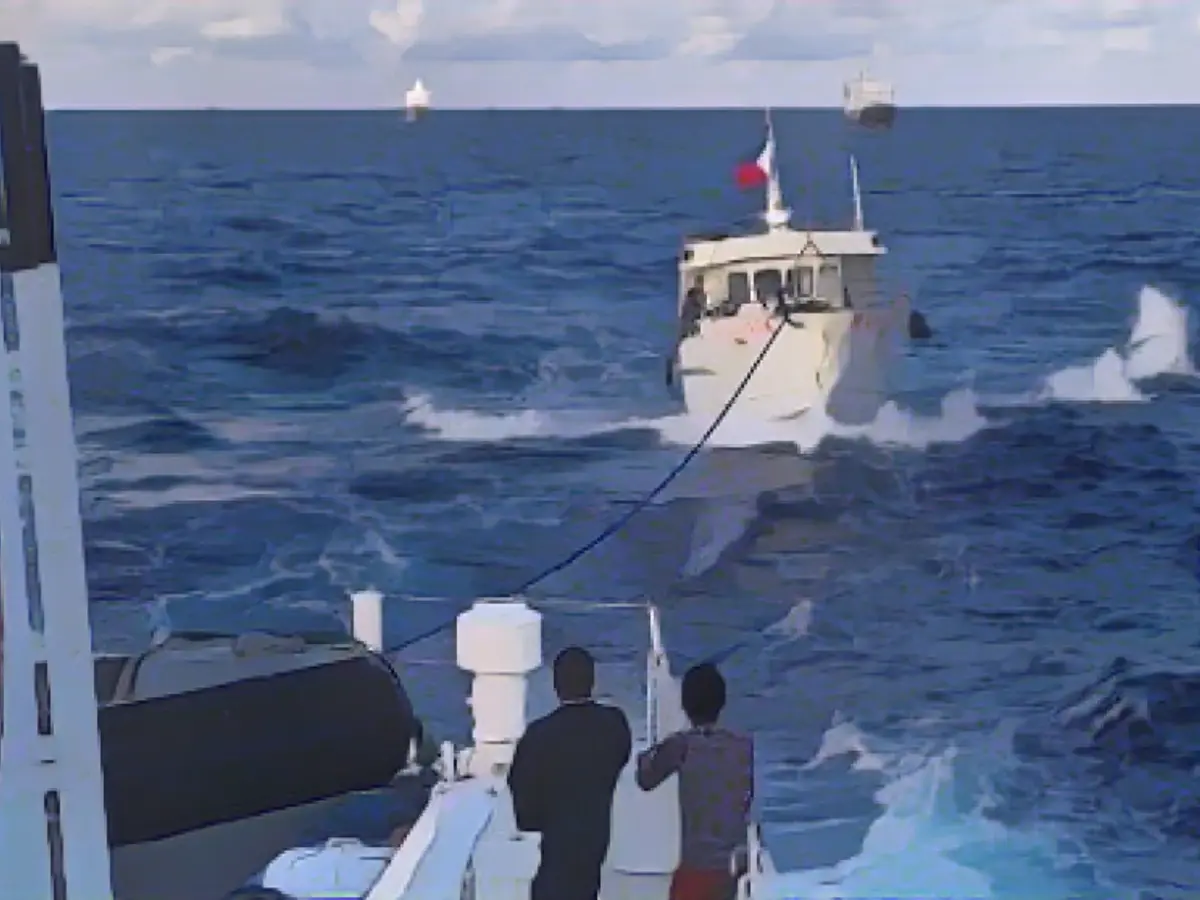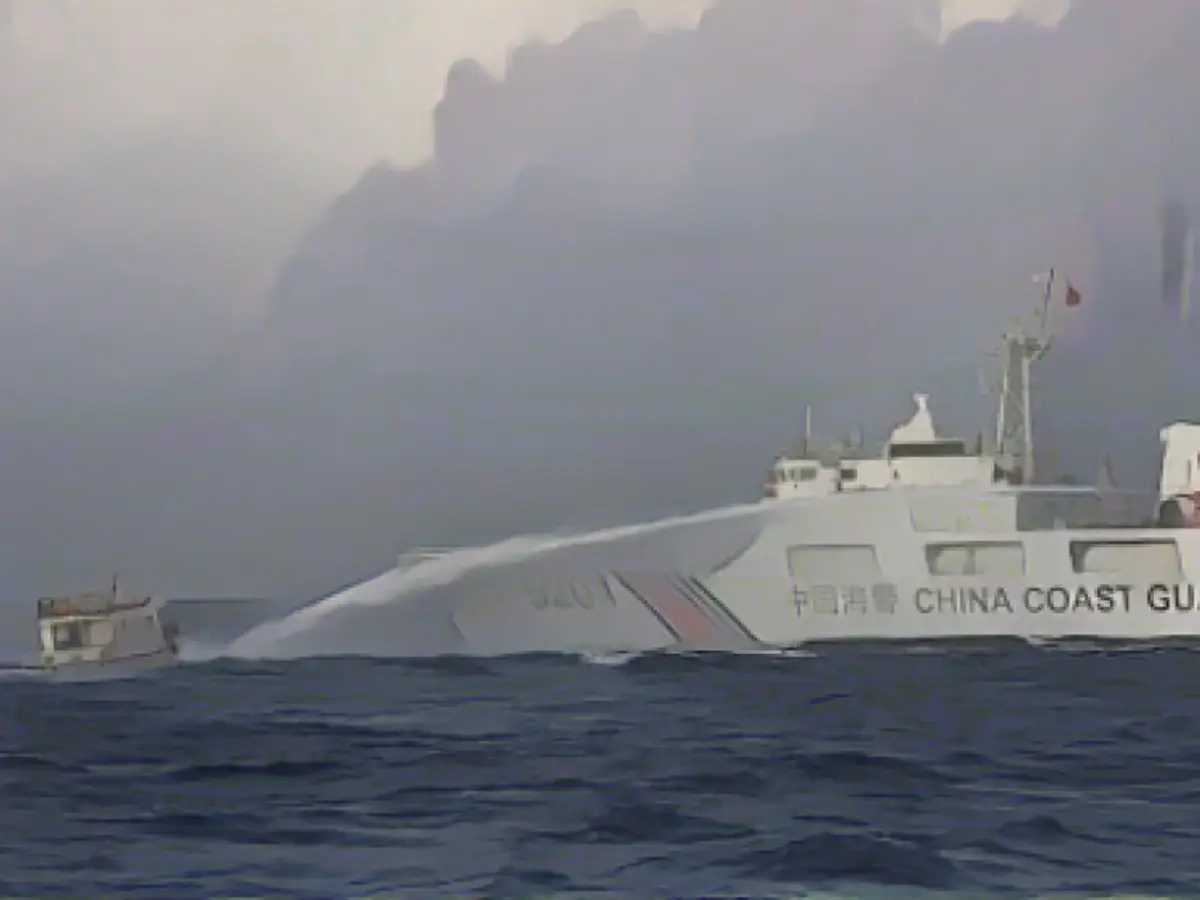Title: Tensions Rise in South China Sea as China Engages in Aggressive Behavior
On Sunday, tensions between China and the Philippines escalated as Chinese ships were reported to have engaged in aggressive maneuvers against two Philippine supply vessels, blocking their path and using water cannons. One of the ships sustained severe engine damage and had to be towed back to shore, while the other suffered a broken mast.

Beijing dismissed the accusations made by the Philippines, claiming that the Philippine ship was responsible for the "deliberate collision" due to ignoring clear warnings and suddenly changing course.

The underlying conflict
The incident occurred near the Second Thomas shallows, about 200 kilometers west of Palawan. The Philippines claimed that the ships were on their way to supply soldiers stationed near the area, which is under the Philippines' exclusive economic zone (EEZ). The soldiers have been holding out on a warship, the BRP Sierra Madre, which ran aground in 1999 and has since represented the Philippines' claim to the area.
The Chinese coast guard strongly objected to the Philippine ships' presence, claiming that they were there illegally and without permission from the Chinese government.
The South China Sea dispute
The South China Sea is a contested territory, with China, the Philippines, Vietnam, Malaysia, Taiwan, and Brunei all having claims to different territories within the region. China claims almost the entire South China Sea under its "nine-dash line" and has used coercion and intimidation to assert its maritime claims and harm the interests of other claimant countries.
The conflict extends beyond national borders and has significant implications for international politics. The Philippines, in particular, has repeatedly reported incidents of water cannon attacks, blocking, and ramming by Chinese ships in the disputed territory, raising international concern and condemnation.
International response
The international community, including the United States, Japan, Australia, and EU nations, has criticized China's aggressive actions and called for a peaceful resolution to the conflict. However, a unified international response to China's actions has been challenging, with limited enforcement mechanisms to halt these provocations.
Despite the lack of a cohesive international response, some countries, such as the United States and Japan, have increased military exercises, expanded bases, and increased naval patrols in the region. These efforts aim to deter further Chinese aggression and signal a strong commitment to support regional allies and uphold the rule of law in the South China Sea.
Additional Insights
- Chinese aggressive actions in the South China Sea challenge international law and threaten peace and stability in the region.
- The Philippine military and its allies, such as the United States, are on high alert and taking measures to deter further Chinese aggression.
- The South China Sea is a vital waterway, carrying a significant share of global trade. Control of the waterway could impact energy security and economic growth for many countries in the region.
- The South China Sea dispute has been a long-standing issue, with many failed negotiations and talks between China and other claimant countries.
- The South China Sea dispute is a complex and sensitive issue, affecting the relations between China, the United States, and other regional powers, such as Japan and Australia.
- China's aggressive behavior in the South China Sea highlights the growing tensions in the region and the need for a unified international response to preserve peace, stability, and the rule of law.
Enrichment Data:
- This dispute over the South China Sea extends beyond national borders, involving countries like the Philippines and China in significant international politics-abroad.
- The South China Sea is a vital waterway, carrying a significant share of global trade. Control of the waterway could impact energy security and economic growth for many countries in the region.
- The Philippines has been vocal about Chinese activities in the South China Sea, with reports of water cannon attacks and physical assaults against Philippine vessels.
- The South China Sea dispute is a long-standing issue, with many failed negotiations and talks between China and other claimant countries.
- China's aggressive behavior in the South China Sea highlights the growing tensions in the region and the need for a unified international response to preserve peace, stability, and the rule of law.








